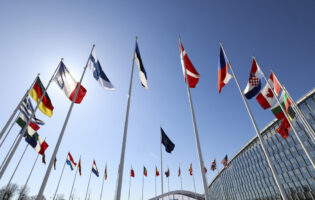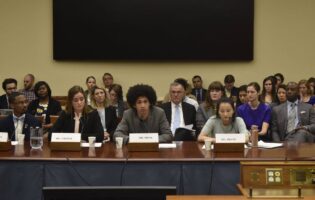Understanding the “God Gap”: Religion, Politics, and Policy in the United States and Germany
Cathleen S. Fisher
Dr. Cathleen S. Fisher is the President of the American Friends of the Alexander von Humboldt Foundation. She has been engaged in transatlantic and German-American relations for over 25 years. She joined American Friends in 2008 as executive director. From 2002-2006, she was deputy director of the American Institute for Contemporary German Studies (AICGS), The Johns Hopkins University, where she was centrally involved in management of all operations and programs in support of the Institute’s mission. Before joining AICGS, Fisher served for ten years as a senior associate at the Henry L. Stimson Center, where she focused on nuclear arms control, export controls, and transatlantic security issues.

Lily Gardner Feldman
Senior Fellow
Dr. Lily Gardner Feldman is a Senior Fellow at AICGS. She previously served as the Harry & Helen Gray Senior Fellow at AICGS and directed the Institute’s Society, Culture & Politics Program. She has a PhD in Political Science from MIT.
From 1978 until 1991, Dr. Gardner Feldman was a professor of political science (tenured) at Tufts University in Boston. She was also a Research Associate at Harvard University’s Center for European Studies, where she chaired the German Study Group and edited German Politics and Society; and a Research Fellow at Harvard University’s Center for International Affairs, where she chaired the Seminar on the European Community and undertook research in the University Consortium for Research on North America. From 1990 until 1995, Dr. Gardner Feldman was the first Research Director of AICGS and its Co-director in 1995. From 1995 until 1999, she was a Senior Scholar in Residence at the BMW Center for German and European Studies at Georgetown University. She returned to Johns Hopkins University in 1999.
Dr. Gardner Feldman has published widely in the U.S. and Europe on German foreign policy, German-Jewish relations, international reconciliation, non-state entities as foreign policy players, and the EU as an international actor. Her latest publications are: Germany’s Foreign Policy of Reconciliation: From Enmity to Amity, 2014; “Die Bedeutung zivilgesellschaftlicher und staatlicher Institutionen: Zur Vielfalt und Komplexität von Versöhnung,” in Corine Defrance and Ulrich Pfeil, eds., Verständigung und Versöhnung, 2016; and “The Limits and Opportunities of Reconciliation with West Germany During the Cold War: A Comparative Analysis of France, Israel, Poland and Czechoslovakia” in Hideki Kan, ed., The Transformation of the Cold War and the History Problem, 2017 (in Japanese). Her work on Germany’s foreign policy of reconciliation has led to lecture tours in Japan and South Korea.

Rolf Schieder
Humboldt University
Prof. Rolf Schieder holds the chair of Practical Theology at Humboldt University. He is the speaker of the Program on Religion and Politics. His research is focused on politics of religion, interreligious competences, and religion and economics. He is the author of “Wieviel Religion vertraegt Deutschland?” (2001) and editor of “Religion and Politics in the United States and Germany. Old Divisions and New Frontiers” (2007).
German-American Issues 4
In foreign and domestic policy, the United States and Germany would appear to be drifting further apart. Despite their continuing economic interdependence, the rancorous transatlantic policy debates over such diverse issues as the Iraq war, the Kyoto Protocol and global climate change, UN reform, or the U.S. treatment of prisoners at Guantanamo have fueled a sense of mutual alienation, prompting observers on both sides of the Atlantic to wonder whether the United States and Europe continue to constitute a “community of values.”









